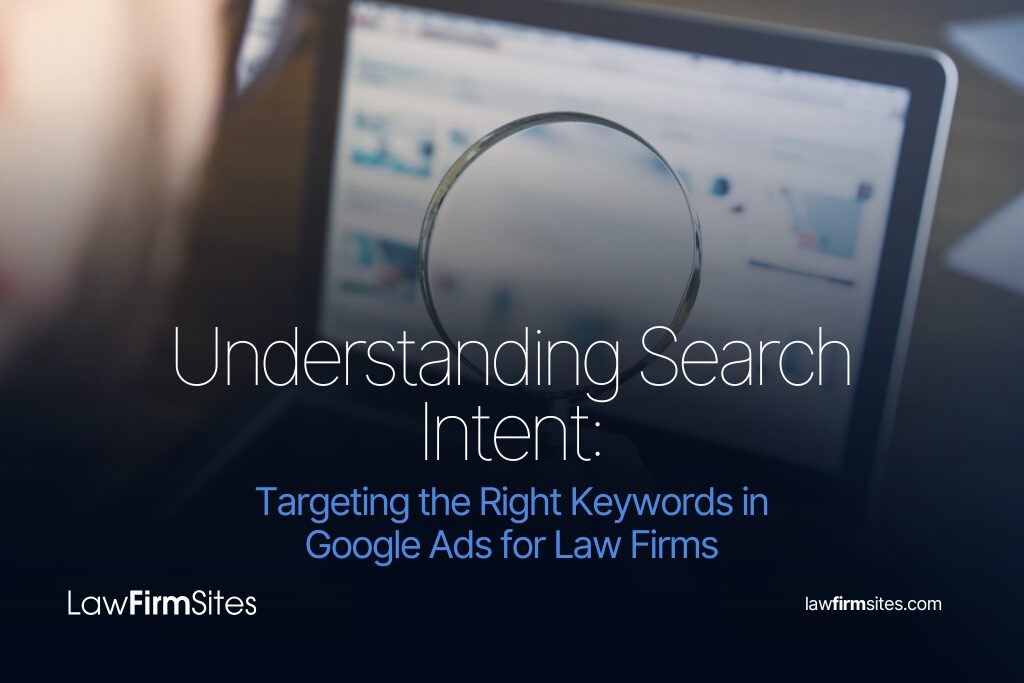Understanding Search Intent: Targeting the Right Keywords in Google Ads for Law Firms

Every successful Google Ads campaign starts with understanding search intent. Search intent, sometimes called “user intent,” refers to the reason behind a search query.
Why did someone type “personal injury lawyer near me?” What answers are they hoping to find? Are they ready to hire, just researching, or comparing options?
For law firms investing in Google Ads (pay-per-click), targeting keywords without considering search intent is like throwing darts blindfolded. You may hit the board, but you’ll rarely score a bullseye.
Four Primary Types of Search Intent
When optimizing Google Ads for law firms, it is essential to understand the four primary types of search intent.
Each one represents a different mindset and level of urgency:
Informational Intent
People with informational intent are searching for knowledge. They might type queries like:
- How does personal injury law work in Florida?
- Steps to file for divorce in Texas
At this stage, users aren’t necessarily looking to hire a lawyer yet; they’re gathering information.
Navigational Intent
A user with navigational intent knows where they want to go. They might search:
- Smith & Smith Law Firm website
- Johnson Legal Group phone number
For law firms, branded keywords fall into this category. These users are often repeat clients or people referred by others.
Transactional Intent
Transactional intent means the user is ready to take action. Queries like:
- Hire a personal injury attorney in Miami
- Affordable criminal defense lawyer near me
These kinds of keywords signal that the person is looking to hire immediately. These are the most valuable keywords for driving conversions in Google Ads.
Commercial Intent
This intent sits between informational and transactional. The user is evaluating options but not quite ready to commit.
Searches like:
- Best family law firm in Chicago
- Personal injury lawyer reviews in Dallas
These keywords indicate they’re comparing firms.
Effective PPC campaigns for law firms should target these keywords with ads that highlight unique selling points, testimonials, or awards. Landing pages should offer detailed service descriptions and proof of expertise, nudging potential clients closer to a decision.
Importance of Targeting the Right Keywords
Law firm advertising budgets aren’t infinite. Wasting money on keywords that don’t match your clients’ intent means fewer leads and lower ROI.
Google’s auction system rewards relevance; ads that match search intent typically enjoy higher Quality Scores, lower cost-per-click, and better ad placement.
For law firms, where each lead can mean thousands in potential revenue, dialing in on intent isn’t just best practice; it’s essential for survival in competitive markets.
Beyond cost and click-through rate (CTR), targeting the right keywords enhances the user experience. If someone searches “DUI lawyer consultation” and lands on a page explaining criminal law basics instead of offering a direct consultation, they’re likely to bounce.
Satisfying search intent boosts engagement and raises the odds of converting visitors into clients. Additionally, accurately targeting keywords feeds into your long-term SEO strategy. By aligning paid and organic strategies, you can enhance your efforts in ranking law firm websites, leading to compounding benefits across your digital footprint.
Choosing the Right Keywords for Law Firms
Targeting the right keywords for Google Ads isn’t just about picking the most searched phrases. It’s about understanding the mindset of your ideal client and mapping those needs to each stage of the client journey.
Selecting keywords for Google Ads isn’t just about picking the most searched phrases. It’s about understanding the mindset of your ideal client and mapping those needs to each stage of the client journey.
Research Your Audience
Start by creating detailed client personas.
- What legal problems do your target clients face?
- What language do they use?
Tools like Google Keyword Planner, SEMrush, and even client intake forms can reveal how real people search for your services.
Use Specific, Relevant Keywords
Law is local. Someone searching “estate planning lawyer in Tampa” is far more valuable to a Florida firm than a generic “estate lawyer.”
Include location, case types, and relevant qualifiers. Instead of just “divorce lawyer,” consider “female divorce attorney near Houston” or “divorce lawyer for business owners in California.”
Balance Short-Tail and Long-Tail Keywords
Short-tail keywords, such as “lawyer” or “attorney,” have high search volume but fierce competition and unclear intent. Long-tail keywords, like “child custody attorney offering free consultations in Denver,” may draw fewer searches, but the intent is laser-focused, leading to higher conversion rates.
Use Negative Keywords
Negative keywords prevent your ads from showing on irrelevant searches. If you’re a personal injury firm, add negative keywords like “pro bono,” “jobs,” or “law school” to avoid wasting money on unrelated clicks.
Review Competitor Strategies
Study what keywords your competitors are targeting. Tools like SpyFu or Ahrefs reveal what’s working for other law firms in your market, helping you uncover gaps or new opportunities.
Assessing the Success of Keywords in Google Ads Campaign
Knowing which keywords are driving real value is just as important as choosing them in the first place. Measuring performance isn’t just about vanity metrics; it’s about tracking leads, conversions, and ultimately, new cases for your law firm.
- Track conversions, not just clicks. Clicks are meaningless unless they lead to results.
- Monitor Cost Per Lead and ROI. Not all keywords are created equal. Some may bring lots of clicks but few conversions.
- Use A/B Testing. Regularly test different ad copy, calls to action, and page layouts to see what resonates most with your target audience.
- Analyze search term reports. Use these reports to refine your keyword and negative keyword lists.
- Review lead quality. It’s not just about quantity. Work closely with intake staff to review the quality of leads coming in through your ads.
- Iterate based on data. Regularly review campaign performance, adjust bids, add or remove keywords, and stay on top of emerging trends.
Successful digital marketing for law firms is never static. By refining your approach to search intent and keyword targeting, you give your firm a measurable edge in ranking law firm websites and capturing the best possible clients.
Final Takeaways
Targeting the right keywords in Google Ads is about more than visibility—it’s about connecting with the right clients at the right time. By understanding search intent and aligning your campaigns accordingly, your law firm can attract high-quality leads, reduce wasted ad spend, and see better results from every dollar invested.
From transactional keywords that drive immediate action to informational content that nurtures future clients, a well-structured strategy built around user intent is key to standing out in a competitive market.
If you’re ready to improve your ad performance and capture more qualified leads, contact Law Firm Sites today to discuss a custom Google Ads strategy tailored to your firm’s goals.
Did you like this post? Here are some others you might enjoy:

By Benjamin R. Gold, Esq., Founder of Lawyer Stories Over the years, I’ve had the privilege of interviewing over two…

Managing multi-location SEO for law firms is about earning visibility for each office without creating pages that feel repetitive or…

Law firms can compete without large marketing budgets by building durable visibility, improving conversion efficiency, and earning trust faster than…

